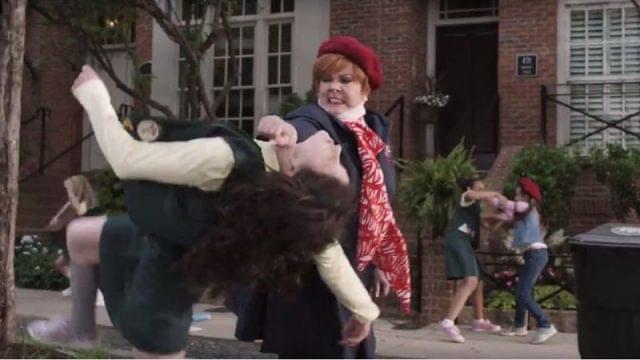
Let us stipulate that Melissa McCarthy is funny. She just is. She has brilliant instincts, she can play sweet just as convincingly as vulgar, and her character work is always fully committed and fundamentally amusing, even in material that isn’t very good.
That includes “The Boss,” unfortunately, a flat, careless comedy and a real disappointment. And it pains me to say it because McCarthy and her husband, Ben Falcone, both of whom are funny, wrote the screenplay, which largely isn’t. (Falcone directed, too, as he did with the couple’s previous film, “Tammy.”) How can someone so funny be responsible for such mediocrity?
McCarthy plays Michelle Darnell, a ballsy, self-made tycoon and media celebrity who gives business seminars that are like rock concerts. She’s ruthless in business and doesn’t have any personal relationships, the result of growing up hard and unloved in an orphanage. Then she goes to prison for a few months for insider trading, comes out home- and penniless, and ends up on the couch of her ex-assistant, Claire (Kristen Bell), who lives in a humble apartment with her 10-year-old daughter, Rachel (Ella Anderson).
So far, so good. McCarthy nails it as a mean, confident entrepreneur, and Kristen Bell’s earthy sweetness is a fine counterpart. Then we come to the center of the premise, and it’s full of potential: Michelle starts rebuilding her empire by turning young Rachel’s girl scout troop into a brownie-selling army. (Claire has a killer recipe, conveniently. And there aren’t, like, health codes or anything, I guess. Anyway.)
But somehow this perfectly good setup gets botched in the execution. The villain of the piece is Renault (Peter Dinklage), Michelle’s rival and ex-lover who now wants to destroy anything she does. Renault is obsessed with Japanese samurai culture, though the film never really makes anything of that. Dinklage flounders embarrassingly. His comic strengths lie in playing the straight man, not over-the-top, unmotivated weirdness. Renault’s climactic showdown with Michelle fizzles both narratively and comedically, but that’s the screenplay’s fault, not Dinklage’s.
There’s an over-reliance on slapstick, including a strangely cartoonish gag where a hide-a-bed launches McCarthy as if it were spring-loaded. (It’s strange because it’s the only joke in the movie that’s physically impossible.) There’s also — you can see it coming, and you groan, and you’re right to groan — the obligatory part of the plot where Michelle’s stony heart is softened by being part of Claire and Rachel’s family, but not before she does something that hurts their feelings, which makes her feel remorse for the first time. Even if we accept that this arc is required in a mainstream comedy, people as clever as McCarthy and Falcone should have been able to find a way to liven it up.
Then there are the things that make me wonder if a whole bunch of material was cut from the film, or if the screenplay is just sloppy. To wit:
Kathy Bates is introduced as Michelle’s old mentor, who now hates her but has grudging respect for her. She does Michelle a minor favor, in a scene with no punchline, and is then never seen again. Why include her at all? Why have Kathy Bates play her?
Beloved character actress Margo Martindale plays the nun at the orphanage where Michelle grew up, seen in a series of flashbacks at the beginning of the film. She only has a couple of throwaway lines in those scenes; surely we’re coming back to her later, maybe in the context of Michelle returning to the orphanage for guidance. Right? Nope. The nun is never seen again.
“SNL’s” Cecily Strong is similarly wasted in a couple of brief scenes as Claire’s new boss. And there’s Tyler Labine as Claire’s co-worker, tacked on as an unnecessary and unconvincing romantic interest for her.
Which isn’t to say the movie is never funny. It has its moments, and even at its worst, it’s not grating. Just flat. And disappointing. Sigh.
P.S. At no point in this movie do we see Melissa McCarthy’s neck. Every outfit she wears — and she wears many — covers her entire neck up to the jawline. Even when Michelle is sitting around the house, watching TV, no part of her neck is visible. You don’t realize how weird it is to never see someone’s neck until you watch an entire movie where it’s covered up.
C (1 hr., 39 min.; )





